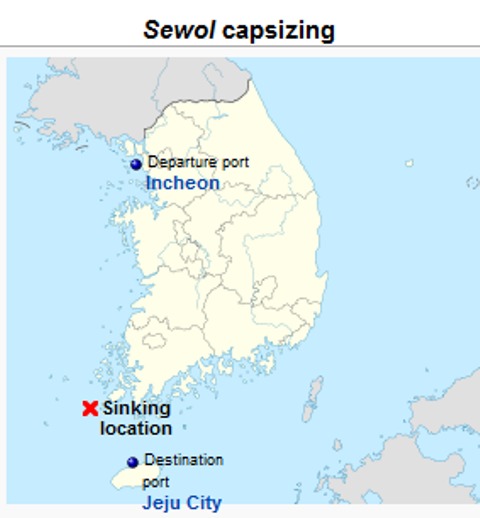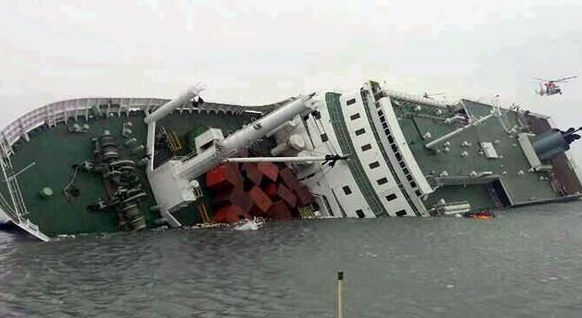Headline
Rage, grief in town of missing students in ferry sinking ‘My baby’s trapped in cold waters’

Location of South Korean ferry capsizing on April 16, 2014. The ferry capsized 2.7 kilometres (1.7 mi) off Gwanmae Island, Jindo County, South Jeolla Province, South Korea. (Wikipedia photo)
ANSAN, South Korea – The most poignant reminders of what’s been lost here are the most ordinary.
Desks in the classrooms of Danwon High School in Ansan, where dozens of students were missing and feared dead Thursday after a ferry disaster, are cluttered with textbooks, gym clothes, empty water bottles – small bits of ordinary school life now infused with heartbreak.
There is fury as parents and students lash out at the swarming news media. Horror, too, as they picture loved ones trapped in the cold and dark of a flipped, submerged ferry. Most refuse to believe that, even after dozens of attempts, a friend, a child, a sibling won’t answer their cellphone. They keep calling.
They try to nourish any link, no matter how small, to the missing: Parents and school workers have locked up the missing students’ belongings because their schoolmates were taking them home as keepsakes, mementos of friends they believe are dead.
One message on a blackboard reads: “Please, everyone return safely!” Another: “Jin-yong! Please come home alive.”
More than 320 Danwon High School second-year students – mostly 16- and 17-year-olds – left Tuesday night for what was supposed to be one of the highlights of the year, a 14-hour overnight ferry trip to the southern resort island of Jeju for four days of fun. Now, as the hours stretch on since the ferry sank Wednesday with no word about more than 270 missing passengers among the 475 people on board, Ansan fears the worst.
“Do you believe they’re still alive?” Lee Mi-shim, a 48-year-old mother of a missing student, asked a reporter as tears streamed down her face. “I know the chances aren’t good. … No one in his class has been rescued.”
Lee, whose husband died about 10 years ago, had heart surgery a few years ago. Her son, Kim Ki-su, always told her that he’d eventually become a Korean traditional doctor to help her. “I feel like collapsing. At least then I’d die earlier than him,” Lee said.
The 25 people confirmed dead Thursday include at least four students and two teachers, and there’s fear that number will go much higher because so many of the passengers were from the school. More than a dozen teachers were on board.
“My baby is trapped in cold waters now. How can I sleep comfortably?” said a 63-year-old grandmother of a missing student who gave only her surname, Kim, tears welling in her eyes as she explained why she stayed overnight at the school’s auditorium waiting for news about the search. “I cannot live without him.”
There were huge swings in emotions Thursday at the school’s auditorium, where hundreds of family members, students, residents and aid workers gathered, desperate for news. Volunteers, wearing green or yellow vests, cleaned the school and provided coffee, fruit, rice, kimchi and instant noodles.
In the morning, people sat and stared vacantly at a giant TV screen broadcasting news of the sinking. Some women wiped away tears. One middle-aged woman wept as she talked on her phone. Tired-looking students sat on chairs, repeatedly checking their phones.
Later in the day, fury erupted over the pace of the rescue operation.
Angry parents and students cursed and shoved reporters, photographers and TV cameramen, while about 10 female students wailed loudly and hugged each other. An unidentified middle-aged man shouted, “Let’s smash their cameras the next time we see another flash.”
The school, nestled in a quiet, clean residential area, was founded in 2005 and has more than 1,200 students and 85 teachers. The area is a half hour’s drive from an industrial complex where many parents of students work at factories, according to residents. Ansan has a population of about 770,000, about 40,000 of whom are foreign workers from China, Thailand, Vietnam and other countries, according to city officials.
Many South Korean high schools organize trips for first- or second-year students, and Jeju is a popular destination. Students and parents in Ansan spoke of the excitement of the annual trip. The students have taken ferries to the southern island in recent years because they can spend more time with each other. They take pictures of the stars, of the ocean and islands, of each other. They gossip. They bond in a way not possible on shorter plane or train trips. Then, after the four-day trip is over, they fly back home.
Kim Eun-taek, an 18-year-old third-year student, knows more than 10 of the missing students, including one of his best friends.
“He lives next door. We used to play at my house together. He cooked food for me, fried sweet potatoes … fried vegetables,” said Kim, putting up his sweatshirt hood and lowering his head.
Ko Jae Hyoung, who sells fried chicken near the school, said the neighbourhood is close-knit. Students grow up together, graduating from the same elementary and middle schools.
Ko closed his restaurant Wednesday to volunteer at the school. That night, he and about 30 others held a candlelight vigil to pray for the safe return of the students. Dozens of residents held vigils again on Thursday night.
Ko, whose daughter is a first-year student at the school, remembers some of the missing students visiting his restaurant to eat chicken and joke around with him.
“Now, the neighbourhood is like a funeral home,” he said.
___
Klug contributed from Seoul.






















